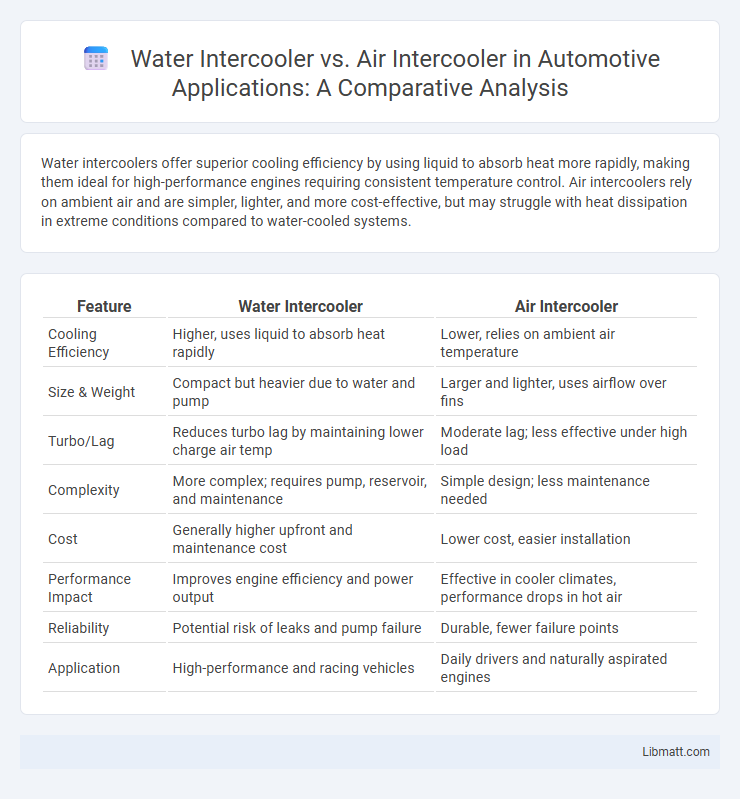Water intercoolers offer superior cooling efficiency by using liquid to absorb heat more rapidly, making them ideal for high-performance engines requiring consistent temperature control. Air intercoolers rely on ambient air and are simpler, lighter, and more cost-effective, but may struggle with heat dissipation in extreme conditions compared to water-cooled systems.
Table of Comparison
| Feature | Water Intercooler | Air Intercooler |
|---|---|---|
| Cooling Efficiency | Higher, uses liquid to absorb heat rapidly | Lower, relies on ambient air temperature |
| Size & Weight | Compact but heavier due to water and pump | Larger and lighter, uses airflow over fins |
| Turbo/Lag | Reduces turbo lag by maintaining lower charge air temp | Moderate lag; less effective under high load |
| Complexity | More complex; requires pump, reservoir, and maintenance | Simple design; less maintenance needed |
| Cost | Generally higher upfront and maintenance cost | Lower cost, easier installation |
| Performance Impact | Improves engine efficiency and power output | Effective in cooler climates, performance drops in hot air |
| Reliability | Potential risk of leaks and pump failure | Durable, fewer failure points |
| Application | High-performance and racing vehicles | Daily drivers and naturally aspirated engines |
Introduction: Understanding Intercoolers
Intercoolers improve engine efficiency by cooling compressed air before it enters the engine, enhancing performance and preventing overheating. Water intercoolers use coolant to absorb heat more effectively, providing better thermal management in high-performance or high-temperature conditions. Choosing between a water intercooler and an air intercooler impacts your engine's responsiveness, with water intercoolers offering faster heat dissipation for optimal boost pressure and power output.
What Is a Water Intercooler?
A water intercooler uses a liquid coolant, typically water or a water-glycol mix, to absorb and dissipate heat from compressed air, making it more efficient at cooling than air intercoolers. This system circulates the coolant through a heat exchanger, reducing the intake air temperature and improving engine performance by increasing air density. Your engine can benefit from a water intercooler's superior cooling capacity, especially in high-performance or turbocharged applications where consistent intake temperature control is crucial.
What Is an Air Intercooler?
An air intercooler cools the compressed air from a turbocharger or supercharger by passing it through a series of metal fins exposed to outside air, reducing its temperature before entering the engine. This process increases air density, enhancing combustion efficiency and power output while lowering the risk of engine knocking. Your vehicle benefits from an air intercooler's straightforward design and effective cooling, especially in environments with steady airflow.
How Water Intercoolers Work
Water intercoolers use a liquid coolant to absorb heat from the compressed air, transferring thermal energy away more efficiently than traditional air intercoolers. The coolant circulates through a heat exchanger, reducing the intake air temperature before it enters the engine, enhancing combustion efficiency and power output. This system's ability to maintain consistent cooling performance under varying environmental conditions makes it superior in high-performance and forced induction applications.
How Air Intercoolers Work
Air intercoolers work by using ambient air to absorb heat from the compressed air produced by the turbocharger or supercharger, cooling it before it enters the engine. This process increases air density, boosting oxygen content for improved combustion efficiency and engine performance. Your engine benefits from lower intake temperatures, reducing the risk of detonation and enhancing overall power output.
Efficiency Comparison: Water vs Air Intercoolers
Water intercoolers offer superior efficiency compared to air intercoolers due to water's higher specific heat capacity, allowing faster and more effective heat absorption from compressed air. Air intercoolers rely on ambient airflow which varies with driving conditions, limiting their cooling performance especially during slow speeds or hot weather. The increased thermal conductivity of water in water intercoolers maintains lower intake air temperatures, resulting in improved engine power and reduced risk of detonation.
Installation and Maintenance Requirements
Water intercoolers require more complex installation involving coolant lines, pumps, and reservoirs, which may increase initial setup time and cost. Their maintenance demands periodic checks for leaks, coolant replacement, and system flushing to prevent corrosion and contamination. Air intercoolers offer simpler installation with direct airflow cooling, and they generally require less frequent maintenance, limited to cleaning the fins and inspecting for damage, making them a more straightforward choice for ease of upkeep.
Performance Impact in Different Applications
Water intercoolers offer superior heat dissipation compared to air intercoolers, resulting in lower intake air temperatures and enhanced engine performance, especially in high-boost or turbocharged applications. Air intercoolers are generally simpler, more cost-effective, and perform well in scenarios with adequate airflow, such as naturally aspirated or less aggressive turbocharged engines. In motorsports or heavy-duty trucks, where sustained cooling efficiency is critical, water intercoolers provide a significant performance advantage by maintaining consistent intake temperatures under extreme conditions.
Cost Analysis: Water vs Air Intercoolers
Water intercoolers typically have higher upfront costs due to additional components like pumps, reservoirs, and water lines, but they offer superior cooling efficiency that can enhance engine performance and longevity. Air intercoolers are generally more affordable and easier to install with lower maintenance expenses, making them a cost-effective choice for many users. Your decision should weigh the balance between initial investment and long-term performance benefits aligned with your specific vehicle requirements.
Choosing the Right Intercooler for Your Needs
Water intercoolers offer superior cooling efficiency and compact design, making them ideal for high-performance or space-constrained applications. Air intercoolers are simpler, more cost-effective, and easier to maintain, suitable for everyday driving and moderate power gains. Your decision should balance cooling requirements, installation space, and budget to optimize engine performance.
Water Intercooler vs Air Intercooler Infographic

 libmatt.com
libmatt.com